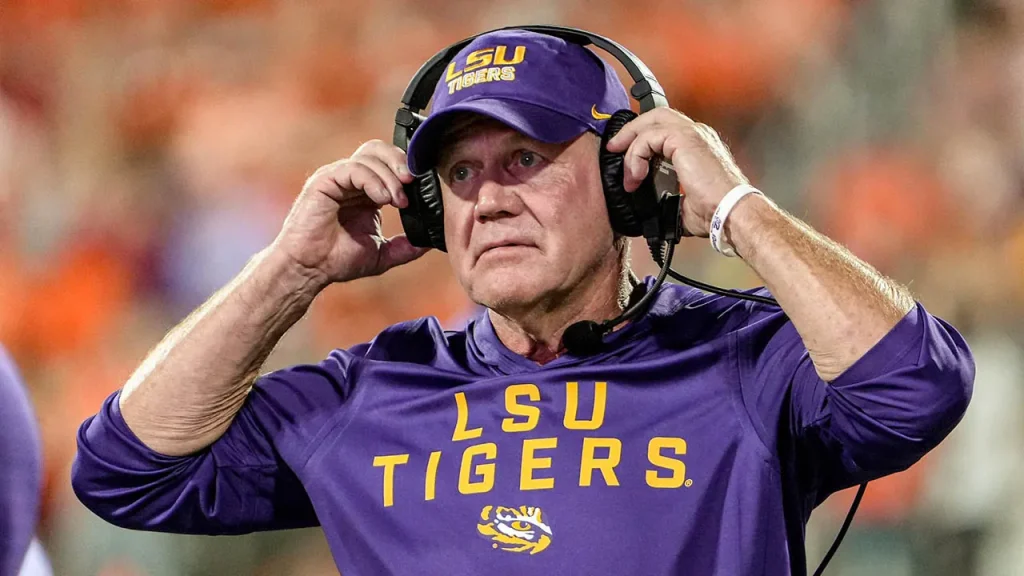Brian Kelly’s Tumultuous Tenure at LSU: A Tale of Disconnect and Disappointment
In December 2021, Brian Kelly stepped away from his historic run at Notre Dame to accept a daunting challenge: leading LSU’s storied football program back to national prominence. Armed with a hefty 10-year contract, Kelly arrived in Baton Rouge with significant expectations. After all, his three predecessors—Ed Orgeron, Les Miles, and Nick Saban—had each delivered national championships by their fourth season at the helm. The bar was set high, and the passionate LSU faithful anticipated nothing less than similar results from their high-profile coaching acquisition. Instead, Kelly’s tenure ended abruptly and unceremoniously before he could even complete his third season, creating ripples of controversy throughout Louisiana football circles.
The decision to part ways with Kelly came after a particularly humiliating loss to Texas A&M, during which the once-raucous Tiger Stadium emptied significantly before the final whistle. While Kelly had managed to achieve back-to-back 10-win seasons in his first two years—a respectable accomplishment on paper—deeper issues were evidently festering beneath the surface. According to multiple sources close to the program who spoke with The Athletic, Kelly’s leadership style created a troubling disconnect between the coach and his players. Perhaps most damning were allegations that Kelly struggled to remember many players’ full names, a shortcoming that rival programs reportedly exploited during recruiting battles with quips like, “He’ll never talk to you guys. He doesn’t even know the players’ names.”
This apparent personal disconnect symbolized a broader cultural mismatch between Kelly and LSU. One staff member bluntly stated, “He really stripped the culture of what this place is. You know this place is not regular, man.” The comment speaks to a fundamental misunderstanding that may have doomed Kelly from the start—an inability to grasp the unique expectations, traditions, and passions that define SEC football generally and LSU specifically. The northeastern-born Kelly, despite his impressive resume at Notre Dame, seemed to approach LSU with the same methodologies that had worked elsewhere, failing to adapt to the distinctive character of Louisiana football culture or build the kinds of personal relationships that typically sustain successful SEC coaches through inevitable rough patches.
The timing of Kelly’s dismissal came amid broader administrative turbulence, as LSU athletic director Scott Woodward—who had originally hired Kelly—was himself fired just days earlier following criticism from Louisiana Governor Jeff Landry. This leadership vacuum at the top created an unusual situation where Kelly was dismissed without a permanent athletic director in place to oversee the transition or selection of his replacement. The quick succession of high-profile departures underscored the volatile nature of SEC athletics, where political considerations, fan expectations, and on-field results create a pressure cooker environment that demands both excellence and cultural alignment.
What makes Kelly’s failure at LSU particularly noteworthy is how it contrasts with his previous success. At Notre Dame, Kelly had become the winningest coach in program history, rebuilding the Fighting Irish into a consistent national contender. His decision to leave South Bend for Baton Rouge had been viewed as a statement about the overwhelming pull of SEC football and its resources. Yet the very qualities that made Kelly successful at Notre Dame—his structured approach and somewhat detached management style—may have undermined him at LSU, where players and fans alike expect a more personal, passionate connection with their head coach. His inability to forge those bonds ultimately made his position untenable, regardless of the win-loss record.
As LSU now faces the dual challenge of finding both a new athletic director and head football coach, the Kelly episode serves as a cautionary tale about the importance of fit and culture in college athletics. Impressive resumes and past successes don’t automatically translate to new environments, particularly when those environments are as unique and demanding as LSU football. The Tigers’ next leadership team will likely prioritize candidates who demonstrate not just tactical football acumen, but an authentic understanding of and appreciation for Louisiana’s football culture. Meanwhile, Kelly departs Baton Rouge having never fully connected with the program he was hired to elevate, leaving behind questions about whether his coaching style can adapt to the evolving landscape of college football, particularly in the relationship-driven world of the SEC.















